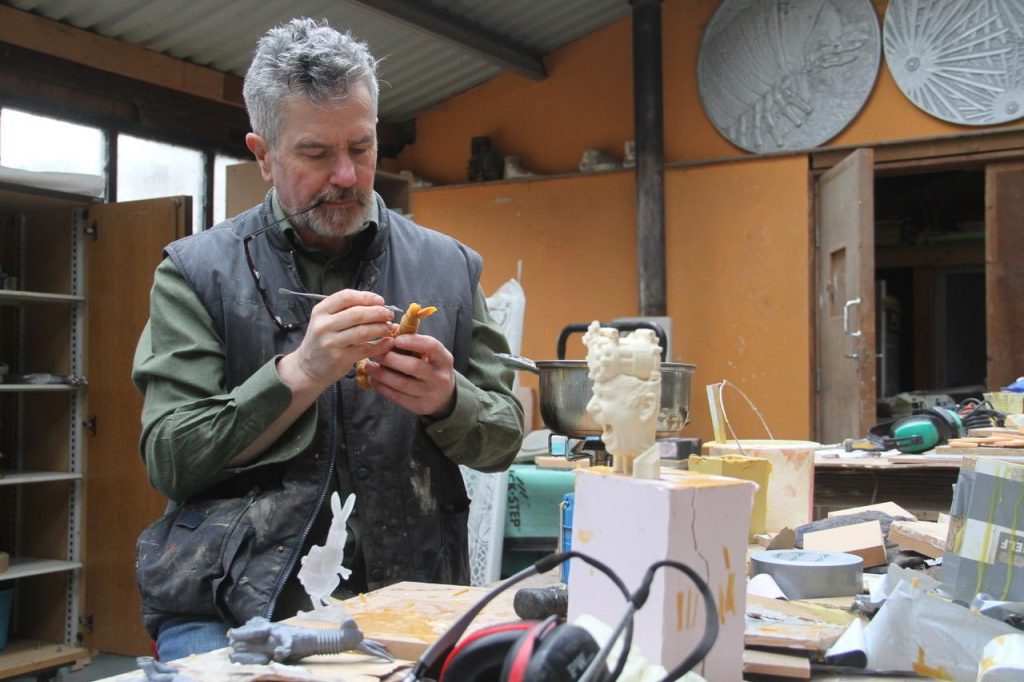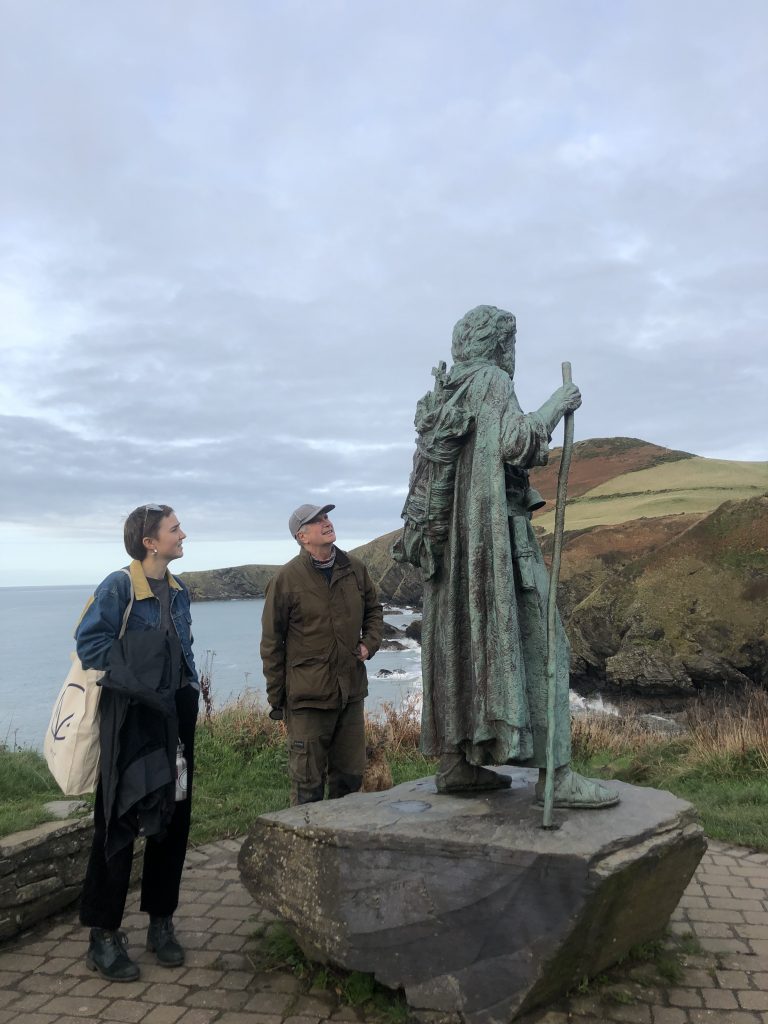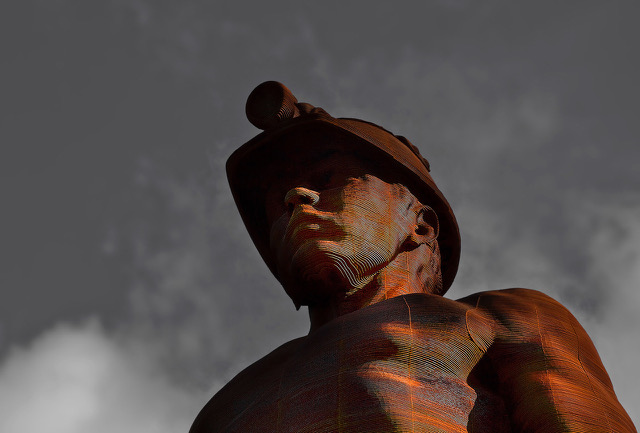Press Release 1.12.21

The Monumental Welsh Women (MWW) statue campaign, in partnership with Cerflun Cymunedol Cranogwen Community Monument (CCCCM), a sub-group of Pwyllgor Lles Llangrannog Welfare Committee are pleased to announce that we will be working with acclaimed sculptor Sebastien Boyesen to create a life-size figurative sculpture of Sarah Jane Rees (1839-1916), known by her bardic name of Cranogwen, who is the third statue commissioned by MWW of a ‘real Welsh woman’.
Cranogwen was born in the parish of Llangrannog in 1839. Mariner, teacher, poet, journalist, preacher, campaigner; her many achievements, made more exceptional by the era in which she lived, saw her shortlisted as one of Wales’s Hidden Heroines. A short biography can be seen on the Hidden Heroines website.
Sculptor Sebastien Boyesen,who provided the community with their beloved St Carannog sculpture, will take forward this prestigious commission. As a contemporary sculptor who lives and works in Llangrannog, Boyesen has a vast portfolio of designing and implementing figurative public artwork across the UK. MWW were extremely impressed with Boyesen’s considered personal research into the historic, social and aesthetic representation of Cranogwen, and his experience and ability to develop a befitting figurative sculpture as an important permanent memorial to Cranogwen.
A site for the long-anticipated sculpture has been sourced in the centre of Llangrannog near the church where Sarah Jane Rees is buried. The sculpture will commemorate Cranogwen’s extraordinary life and her many and varied achievements, made despite the widespread sentiment against women working outside the home and with the limited opportunities available to them in the late 19th and early 20th century. Boyesen and the many contributors towards the project have already embraced the opportunity to create a considered contemporary work to celebrate Cranogwen and her incredible life.
In recognition of Cranogwen, who among other career achievements encouraged the talents of other women, MWW have partnered with Lisa Evans, Programme Director of the degree honours programme in Sculpture at Carmarthen School of Art, Coleg Sir Gâr, to award a paid menteeship for one year to an emerging post-graduate female sculptor from Coleg Sir Gâr to work with Boyesen on this commission. Starting in December 2021, this unique programme is designed to provide support for a female emerging sculptor during the period between education and professional life. Through working with Boyesen on the Cranogwen commission, the awardee will benefit by receiving professional guidance and hands on experience in the development of their practice through working on a live commission in the public realm.

We are extremely pleased to announce that the menteeship has been awarded to Keziah Ferguson, who having recently graduated from Coleg Sir Gâr has demonstrated passion and ambition in continuing her career as professional sculptor. Keziah said,
“I feel incredibly privileged to be involved in the project, to honour the legacy of
Cranogwen. The warm reception I received in Llangrannog has made me doubly excited to start work with Seb and the team.”
Helen Molyneux from Monumental Welsh Women said,
“We are delighted to be able to announce the commissioning of our project’s third statue of a real Welsh woman. Cranogwen was an inspirational woman whose reputation and influence spread not just across Wales but internationally, at a time when many women rarely left villages they were born in. This will be the third statue commissioned by the Monumental Welsh Women project to celebrate the achievements of Wales’ hidden heroines – the women whose contributions to Welsh life and culture have been largely overlooked because of the era they were born in. The first statue was of Wales’s first black head teacher, Betty Campbell, that was unveiled in Cardiff in September. The second, of Elaine Morgan the evolutionary theorist and dramatist, will be unveiled in Mountain Ash in the autumn.
Anne-Marie Bollen, member of CCCCM, said,
“We aim to celebrate the ambition and success of our pioneering local heroine Cranogwen and to commemorate her life and achievements to inspire future generations.”
Sebastien Boyesen has said of the commission,
“Being commissioned to create the statue of Cranogwen is both an honour and privilege and is something I would consider to be a highlight of my career. I look forward to developing the work with our amazing team including working with Keziah as an emerging sculptor mentee, and hope that I can repay the trust placed in me by creating a wonderful legacy for the village and wider community that celebrates the achievements of an inspirational Welsh woman.”
Those wishing to learn more about the project or donate to the cause are encouraged to visit the Cerflun Cymunedol Cranogwen Community Monument page.
-ENDS-
Notes to Editors.
Sculptor Sebastien Boyesen:
Sebastien Boyesen has worked as an artist and designer for over thirty-five years. Committed to creating place-specific artworks within new developments and regeneration schemes. His practice explores communities and their landscapes, often highlighting the relationship between individuals, society, and their memorials. Using a diverse range of sculptural techniques, his work is always sensitive to its environment and is often born from engagement with the communities who live and work near to his sited artworks.

Boyesen lives in Llangrannong, west Wales and has worked on several place-specific sculptural works including Guardian, who was commissioned to commemorate the 50th anniversary of the 1960 mining disaster in Six Bells that claimed the lives of 45 men. The amazing 20 metre sculpture towers over the site of the former colliery where the tragedy occurred and is a fitting tribute to the men whose names are cut into panels wrapped around the memorial. A 7.2m Chartist Man made of stainless steel and the Lantern both sited in Blackwood and This Little Piggy and the Merchant Navy Memorial in Newport to name a few.
Sarah Jane Rees – Cranogwen, text by Professor Jane Aaron:
“Better known by her bardic name of Cranogwen, Sarah Jane Rees was a pioneer in many fields – from poetry to journalism. She defied all the suffocating restrictions of Victorian womanhood to enjoy a ground-breaking career rich in experiences, achievement and adventure. Her first claim to fame was as a master mariner. From the time she was a little girl in Llangrannog, Cranogwen was determined to live a less conventional life. Her parents wanted her to be a dressmaker, but she persuaded her sea captain father to take her on board ship. For two years she worked as a sailor on cargo ships between Wales and France before returning to London and Liverpool to further her nautical education.
She gained her master mariner’s certificate – a qualification that allowed her to command a ship in any part of the world. Back in West Wales – overcoming opposition to the appointment of a woman – she became a head-teacher at 21, educating the children of the village, and taught navigation and seamanship to local young men. Many men who would later go on to sail and captain ships across the world’s oceans were trained by Sarah Jane Rees at this small school on the coast of Ceredigion.
In 1865 her writing skills turned her into an instant Welsh celebrity as she became the first woman to win a poetry prize at the National Eisteddfod – beating the major male Welsh poets of the day, Islwyn and Ceiriog. Writing under the name of Cranogwen, her winning poem Y Fodrwy Briodasal – The Wedding Ring – was a moving satire on the married woman’s destiny, using the wedding ring as a recurring symbol.
She went on to be one of the most popular poets in Wales, winning more eisteddfod prizes and exploring themes from Welsh patriotism to shipwrecks. Her first collection of around 40 poems was published in 1870. And in 1879 she became the first woman to edit a Welsh-language women’s magazine – Y Frythones, a role she relished for 13 years. Packed with stories, poems and features, it campaigned for girls’ education and even had a problem page.
As an editor, Cranogwen also encouraged the talents of other women. Several of the female writers she gave a platform to in Y Frythones went on to successful literary careers.
Cranogwen was brilliant with the spoken as well as the written word. At a time when public speaking by women was frowned upon, she embarked on a career as a lecturer, Temperance campaigner and preacher – travelling across America twice. She often faced considerable opposition from male preachers when she took to the pulpit but was hugely popular with audiences who warmed to her vivid use of language and compelling delivery.
Temperance was an important issue for Cranogwen. She saw the impact of alcoholic excess on family life in much the same way we would view the dangers of drug abuse today. In 1901 she founded Undeb Dirwestol Merched y De (South Wales Women’s Temperance Union). By the time of her death in 1916 there were 140 branches throughout South Wales. One of her most progressive ideas was a refuge for young women. And while she didn’t live to see this dream of a house for homeless girls built, the shelter Llety Cranogwen was opened in her memory in Tonypandy in 1922.
So many pioneering achievements for a woman born 180 years ago.”
Professor Jane Aaron, who is currently writing a biography of Cranogwen, is a member of the Cranogwen Art Steering Group, and will be invaluable in terms of supporting the appointed artist with regards information on Cranogwen’s life and times.
Monumental Welsh Women:
Monumental Welsh Women is a not-for-profit organisation dedicated to recognising the contribution of women to the history and life of Wales. There is currently one statue of real Welsh women in Wales – one! – since the unveiling of Betty Campbell in September. We are working to change this. Our mission is to erect 5 statues honouring 5 Welsh women in 5 different locations around Wales in 5 years. It’s a huge challenge. The profiles of the first 5 women we want to commemorate, and information on our campaign, can be found on our website www.monumentalwelshwomen.org. They are:
Cranogwen
Betty Campbell
Lady Rhondda
Elaine Morgan
Elizabeth Andrews
Monumental Welsh Women works in partnership with independent art and curating consultancy Studio Response, who commission unique site responsive works in the public realm.
CCCCM:
Cerflun Cymunedol Cranogwen Community Monument (CCCCM) is a sub-group of the Pwyllgor Lles Llangrannog Welfare Committee in Llangrannog.
